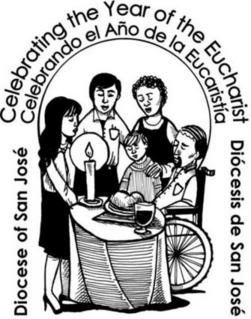 In his letter inaugurating the Year of the Eucharist, Pope John Paul II reminds us to begin at the end:
In his letter inaugurating the Year of the Eucharist, Pope John Paul II reminds us to begin at the end:
The dismissal at the end of each Mass is a charge given to Christians, inviting them to work for the spread of the Gospel and the imbuing of society with Christian values. The Eucharist not only provides the interior strength needed for this mission, but is also —in some sense—its plan. (Mane Nobiscum Domine,Throughout this year, we will explore how the Eucharist we celebrate every Sunday is a plan for spreading the Gospel. We begin by looking at some of the ways our tradition has described what we do on Sunday.
24-25)
Eucharist
Our celebration of the Eucharist, which means “thanksgiving,” reminds us that all of creation is a gift from God. Our ongoing and public thankfulness for all God has given us is a powerful witness to those who are unaware of God’s bountiful love. “Eucharist” says we are dependent on a loving creator for all we have.
Lord’s Supper
The Eucharist is also called the “Lord’s Supper” because what we celebrate is a meal. Of all of Jesus’ meals, it is especially his “last supper,” the meal before his death, which gives shape to Eucharist. In that final meal, Jesus gave us the mandate to “do this in memory of me.” As disciples, we continue to gather around the table to eat and drink in constant faithfulness to the Risen Christ.
Breaking of the Bread
The Eucharist was first called the “breaking of the bread.” When the consecrated bread is broken, it is the Body of Christ that is broken. When the wine is poured out, it is the Blood of Christ that flows. These simple actions remind us that our Eucharist is not only a meal; it is also a sacrifice. And, the Pope suggests, it is also a plan for how we are to follow Christ’s example. In the breaking of the bread, we offer ourselves to be broken for the sake of the world, especially the poor.
Sacrifice
When we join ourselves to Jesus’ sacrifice, we are doing what our Jewish ancestors did when they offered sacrifices in the temple. They were giving back to God some of what God had first given to them. In doing so, they were offering their very selves to God. When we offer ourselves as a sacrifice to be broken and poured out for the world, we do so in union with Jesus and with each other as an assembly of believers.
Eucharistic Assembly
“Assembly” comes from the Greek ekklesia, which is, itself, a translation of the older Hebrew word, qahal. A qahal is a divine summons to gather. “The Old Testament qahal is an assembly of those who are gathered together by the Lord for life in the presence of the Lord” (John Gallen, SJ, “Assembly,” The New Dictionary of Sacramental Worship, 71). When the faithful assemble for the Eucharist, we become “the visible expression of the Church” (Catechism of the Catholic Church, 1329).
Liturgy
“Liturgy” means “public work of the people.” The Church teaches that “the liturgy is the summit toward which the activity of the Church is directed; at the same time it is the font from which all her power flows” (Constitution on the Sacred Liturgy, 10). The Eucharist is the public work of all the people of God in union with Christ. While it is not the total work of the Church, liturgy is its most central and most fundamental work.
Mass
“Mass” brings us back to the end. We are sent forth (missio) “so that [the faithful] may fulfill God’s will in their daily lives” (Catechism of the Catholic Church, 1332). The purpose of Eucharist is the sending forth to accomplish the plan that has just been set out for us in our thanksgiving. In this sense, the Eucharist is mostly about what happens after the dismissal. As Pope John Paul II says:
It is the impulse which the Eucharist gives to the community for a practical commitment to building a more just and fraternal society. In the Eucharist our God has shown love in the extreme, overturning all those criteria of power which too often govern human relations and radically affirming the criterion of service: “If anyone would be first, he must be last of all and servant of all” (Mt 9:35). (28, emphasis in original)
In the next article, we will look at Communion and its relationship to Eucharist.
No comments:
Post a Comment